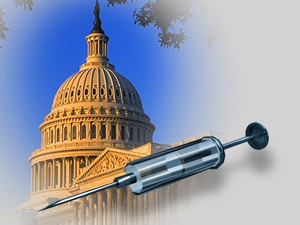-Staff Writer-

(FinalCall.com) – Republican Florida Governor Rick Scott recently signed into law a bill requiring adults applying for temporary cash assistance to undergo drug screening. His rationale is to increase personal accountability and prevent Florida’s tax dollars from subsidizing drug addiction, while still providing for needy children. Parents failing the required drug test may designate another individual to receive the benefits on behalf of the children.
“While there are certainly legitimate needs for public assistance, it is unfair for Florida taxpayers to subsidize drug addiction,” Governor Scott said. “This new law will encourage personal accountability and will help to prevent the misuse of tax dollars.”
However, this new bill flies in the face of research and evidence that proves such bills are ineffective and wasteful.
“Given the high cost of treatment programs and the waiting lists for services in many areas, mandatory drug testing of all applicants or recipients of TANF benefits is a poor use of resources. In a time of tight state budgets, it is perverse to spend limited funds in pursuit of the small number of substance abusers who are not identified through screening processes, rather than on providing actual services,” wrote Matt Lewis and Elizabeth Kenefick of the Center for Law and Social Policy (CLASP) in their February report, Random Drug Testing of TANF Recipients is Costly, Ineffective and Hurts Families.
“Despite the persistence of proposals to impose drug testing at the state and federal levels, these proposals have consistently been rejected because the data do not support the money-saving claims.”
According to the National Conference of State Legislatures many states have proposed drug testing for welfare recipients since the passage of welfare reform in 1996. Drug testing is expressly permitted in the federal rules governing the TANF block grant. Michigan was the first state to implement mandatory drug testing, but the law was found unconstitutional in 2003 by a Michigan Court of Appeals. The Florida legislation is the first to be passed by a state legislature since the Michigan case.
The bill seems to be based more on stereotypes than the facts of life for poor people.
“A lot of stereotypes exist about poor people and why they’re poor. People want to attribute their poverty to poor choices and not to our economy even though we’re coming out of one of the worst economic recessions,” said Elizabeth Lower-Basch, CLASP Senior Policy Analyst.
The bill requires all applicants for TANF to be tested for controlled substance use and the applicant must pay for the drug test. If they test negative the applicant will be reimbursed for the cost by adding the amount to their benefit check.
If an applicant tests positive the applicant is ineligible for benefits for one year, but can reapply in six months if he/she completes an approved substance abuse treatmentprogram.
A parent’s positive test result does not affect the child’s eligibility for benefits; however, any benefits received must be disbursed through a protective payee who must also pass a drug test.
The Florida chapter of the American Civil Liberties Union warned that the bill may be challenged in court and is headed in the same direction as its Michigan predecessor.
“The wasteful program created by this law subjects Floridians who are impacted by the economic downturn, as well as their families, to a humiliating search of their urine and body fluids without cause or even suspicion of drug abuse,” Howard Simon, the chapter’s executive director told reporters.












